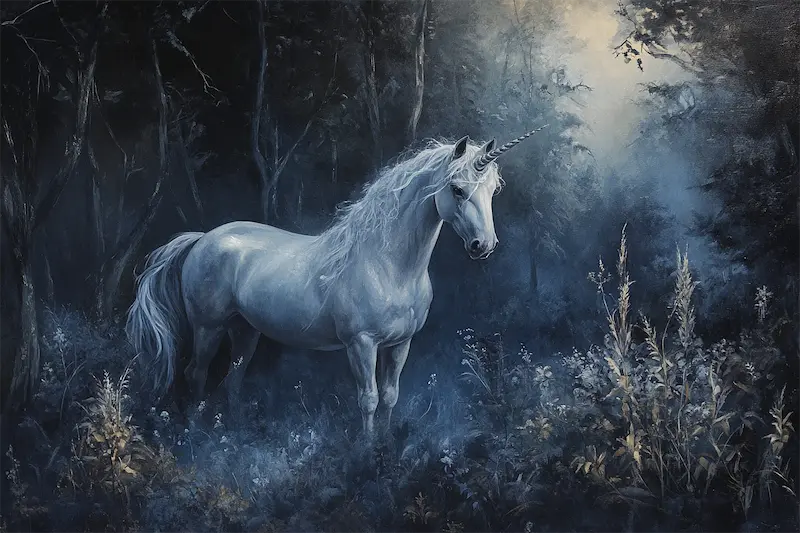What Is a Unicorn?
The unicorn is one of the most iconic and beloved mythical creatures in human culture. Often depicted as a pure white horse with a single spiraled horn on its forehead, the unicorn has long been a symbol of purity, mystical beauty, supernatural power, and unexplained wonders.
First appearing in ancient texts from Greece, Persia, and India, the unicorn quickly spread throughout medieval Europe, becoming a representation of innocence, virtue, and spiritual strength. Unicorns often appeared in art, literature, royal emblems, and collections of mythical creatures.

Appearance and Characteristics of the Unicorn
Distinctive Features
Unicorns are typically described as elegant, horse-like creatures with a shimmering white coat and a long, spiraled horn on their forehead. Their fur radiates a soft glow, while their deep eyes reflect wisdom and compassion. The unicorn’s legendary horn is not only a distinctive feature but also believed to possess healing powers, capable of neutralizing poisons, curing wounds, and warding off evil.
In some legends, unicorns are said to have silver, golden, or pearly hues, depending on their level of purity. Their manes are often portrayed as silky and luminous, enhancing their otherworldly beauty.
Unique Personality
Unicorns are believed to be highly sensitive and deeply value purity. They are said to appear only to those with a pure heart, free from greed and malice. Those with selfish or dark intentions will never see a unicorn, let alone touch one.

Origins and Symbolic Meaning of the Unicorn
Historical Origins
Unicorns have been mentioned in ancient history, with various theories about their origins. In Greek culture, unicorns were described as creatures living in India—a land believed to be home to many strange beings. In medieval European natural history manuscripts, unicorns were portrayed as noble animals, often used as metaphors for the purity of the Virgin Mary.
Some scholars suggest that the unicorn legend may have originated from misinterpretations of real animals, such as the Indian rhinoceros, antelopes, or rare deer species in Asia and Africa.
Symbolic Meaning
Throughout the centuries, the unicorn has symbolized ultimate purity, virginity, absolute truth, and healing power. Its horn was believed to neutralize all poisons, cure diseases, and even grant immortality.

In medieval Christian beliefs, the unicorn became a metaphor for Christ, who could only be subdued by the Virgin Mary, reflecting divine purity and spiritual perfection.
Physical Attributes and Powers of the Unicorn
Supernatural Powers
While unicorns may not possess the overwhelming physical strength of dragons or hydras, they hold divine powers related to healing, protection, purification, and luck. Their horn can cleanse any poison, purify water, and heal both physical and emotional wounds.
Speed and Invisibility
Unicorns are said to move faster than any other creature, capable of passing silently through forests, running over water, or even gliding on beams of light. They also possess the ability to vanish from sight, revealing themselves only to those truly worthy.
Famous Legends and Myths About Unicorns
Medieval Europe
In medieval European mythology, unicorns often appeared in artworks as white horses being hunted, surrendering only to pure, virgin maidens. This served as a powerful metaphor for purity being pursued and controlled by the corrupted world.
Eastern Legends
Although primarily a Western symbol, the unicorn shares similarities with the Qilin of Chinese mythology—a benevolent, auspicious creature bringing peace and good fortune to the world.
Other Notable Legends
In ancient Persian myths, unicorns guarded sacred forests, while in Jewish folklore, unicorn-like creatures were said to survive even the great flood thanks to their extraordinary strength.
The Unicorn’s Influence in Modern Culture
Today, the unicorn remains a beloved icon in popular culture, appearing in movies (Harry Potter, The Last Unicorn), cartoons, video games, fashion, cosmetics, and decorative art.
The unicorn has become a symbol of dreams, magic, optimism, creativity, and freedom from the constraints of reality. In the business world, highly successful startups are often referred to as “unicorns,” highlighting their rare and extraordinary nature.

Similar or Opposite Mythical Creatures
Similar Creatures
- Qilin (Eastern Unicorn): A creature from Chinese mythology symbolizing kindness, purity, and good fortune.
- Pegasus: The winged horse from Greek mythology, representing freedom and intellect.
Opposing Creatures
- Basilisk and Chimera: Dark, chaotic, and destructive creatures representing the opposite of the unicorn’s purity and healing power.
The Unicorn in Feng Shui
Though a Western creature, the unicorn has been adopted into modern feng shui practices as a symbol of protection, energy purification, peace, and health.
Placing unicorn statues in children’s bedrooms, offices, or meditation spaces is believed to attract good luck, balance emotions, and enhance positive energy.
Conclusion
The unicorn remains one of the most cherished mythical creatures of all time—not only for its elegant and ethereal beauty but also for its deep symbolic meanings.
Despite thousands of years of history, the unicorn continues to inspire people as an eternal icon of wonder, purity, and the magical possibilities of life.
